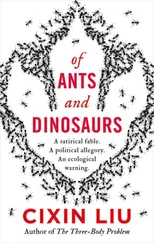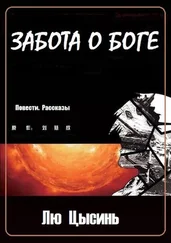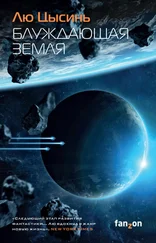The extinguishers went on automatically, filling the cabin with fog and suppressing the fire. Then he realized that a black, branch-like object beneath his feet was twitching. A fire-scorched arm. He grabbed the arm, not knowing whether it belonged to the driver or the loader, but neither would have been so lightweight. He quickly learned the reason: he had pulled up just the upper half of a body, blackened all over, the lower part of the chest still in flames. His hand shook, and the half torso slipped down again. He still couldn’t make out who it was, or why the hand was still moving. He opened the hatch and climbed out as fast as he could. The tank was still moving forward, and he rolled off the back and crashed heavily to the ground, surrounded by clouds of smoke from the tank he had just exited.
After a breeze cleared the smoke, Wang Ran saw his tank at a standstill ahead of him. The smoke had ebbed, but flames were spurting from the interior. It had been hit by a shaped charge, he now knew, one designed to cut through armor by concentrating explosive energy into a high-temperature jet, turning the tank into a furnace. He moved backward, passing a number of other burning tanks, and his burned trousers dropped in shreds from his legs. He turned around at the sound of a dull thud behind him; his tank had exploded and was now a ball of thick flame and smoke. Now he felt an intense pain in his legs and sat right down on the ground, surrounded by explosions and fires, beneath flickering southern lights dulled by the thick smoke in the night sky. He felt the chill wind, and then the colonel instructor’s words echoed in his mind once again:
“…group engagements are more complicated. Now, our tank group and the enemy’s can be thought of in mathematical terms as two matrices, and the entire course of battle as the multiplication of these matrices…”
Bullshit. Complete bullshit. Even now Wang Ran had no idea how matrices were multiplied. Surveying the battlefield, he carefully counted the number of destroyed tanks on each side. The relative damage rate needed to be calculated.
* * *
Three days later, and still dragging his injured leg, Wang Ran got into a third tank, this time as driver. They reached the match location before it was light. More than a hundred tanks were parked along a long brick wall for the wall-smashing game, waiting for the start command. When the command came, they and their opponents, parked behind a parallel wall ten meters beyond theirs, would push the walls over and attack each other. The event required fast reflexes, and the key to victory lay in the attack formation, not shooting skills since there was basically no need to even aim when it came time to shoot. Their instructors back in the Common Era would never have imagined that their students would be firing upon enemy tanks at a distance of just a few meters, much less that the command to shoot would be issued by a Swiss judge, surveying the battle from a helicopter far overhead.
For the next several hours, that wall was all of the outside world Wang Ran could see through the tank’s forward window. It flickered between indistinct and crystal clear as southern lights danced overhead. He inspected it in minute detail, down to the last fracture of every brick and the shape of every segment of still-wet cement, enjoying the interplay of light and shadow on the wall from the aurora australis that he couldn’t see. He discovered for the first time that the world had so many things to enjoy, and he made a decision: If he made it out of this game alive, he would enjoy every inch of the world around him as if it were a painting.
His earpiece broke its five-hour silence with the command to attack. The voice came so suddenly, right in the middle of his careful study of the pattern of cracks in the thirteenth brick in the fourth row up, that he froze for a second. But just one second, and then he slammed the accelerator and sent the giant steel beast leaping forward to smack down the wall alongside the other tanks. As bricks scattered and dirt flew, he realized he was already in the enemy’s armored formation. In the brief, chaotic battle that followed, the constant noise of smoothbore cannon fire and exploding shells, blinding flashes outside, the turret above him spinning rapidly, and the ammo loader grinding away as the smell of propellant filled the cabin, he knew that the gunner had only to fire as quickly as possible in all directions with no need to even aim. The firing frenzy lasted less than ten seconds, until there was a thunderous noise and the world exploded before his eyes.
When Wang Ran regained consciousness he was lying in the battlefield first-aid station. Standing next to him was a reporter for the army newspaper.
“How many tanks do we have left in the battalion?” he asked weakly.
“Not a one,” the reporter said. He should have known. The tanks were close enough to set a world record for armored-vehicle combat. The reporter added, “But I should congratulate you: One to one-point-two! We turned around the relative damage rate for the first time! Your tank destroyed two of theirs, one Leclerc and one Challenger.”
“Zhang Qiang’s amazing,” Wang Ran said, nodding, despite his splitting headache, in recognition of his tank’s gunner.
“So are you. Only one was due to shooting. You flipped the other on impact!”
Wang Ran felt drowsy again owing to lack of blood, and he dropped off with the sounds of frenzied shooting echoing in his ears like a rainstorm beating down endlessly on a metal roof. But all his eyes saw were those abstract patterns on the brick wall.
* * *
The commander of Wang Ran’s armored division stood on a low hill watching the last of her battalions roll out. When the steel skirmish line reached the enemy’s position and the tanks switched on their smoke generators, all she could see was a band of white smoke. A rapid series of explosions followed, and although from this vantage point she couldn’t see the enemy’s tanks, she could see the explosions of the shells they fired at hers, lighting up the band of smoke with dazzling balls of light. At times a silhouette would momentarily be visible amid the fog and explosions. The thirteen-year-old commander had the sudden sense of familiar recognition: back on the morning of the first Spring Festival she set off firecrackers, she had been so frightened after lighting them she had thrown the entire long strand on the ground, where it cracked and thundered, sending hundreds of tiny flashes into the drifting smoke….
But the battle didn’t even last as long as the firecrackers had, and in fact to the commander it seemed even longer than it actually was. Afterward she learned that the shooting had only lasted for twelve seconds. In twelve short seconds, enough to take six breaths, the commander’s one remaining division was annihilated. The Type 99s sat in flames before her; under the thinning smoke it was almost as if they were torches obscured beneath a gauze curtain.
“What’s the damage rate?” the commander asked a staff officer beside her, unable to keep the tremor out of her voice. She stood on the crossroads between heaven and hell, a ghost asking God which road to take. The staffer took off his wireless earpiece and uttered the fiery, icy figure they had obtained at the price of a hundred-odd children’s lives.
“One-point-three to one, sir.”
“Tolerable. Not over the limit,” the commander said, and let out a long breath. She knew that in the invisible distance, enemy tanks equivalent to ten-thirteenths the number of her own were also aflame. The game was still in progress, but she had completed her mission, and kept their relative damage rate below the limit.
* * *
Second Lieutenant Wei Ming, one of Huahua’s classmates, took part in the heavy-weapons subcategory of the tank vs. infantry games with his armored platoon. Unlike the light-arms subcategory, which restricted soldiers to antitank grenades, soldiers in this game were able to use antitank guns and guided missiles against their opponents. By no means did this given them an easier time of it, because while the other game pitted a platoon against a single tank, they were facing three main battle tanks or five light tanks simultaneously.
Читать дальше
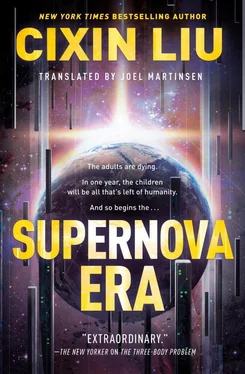
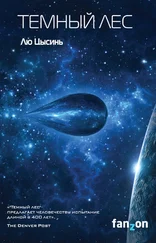
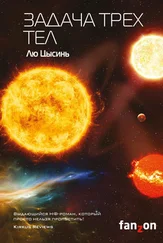

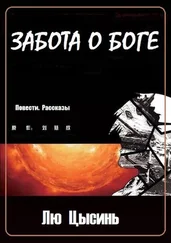

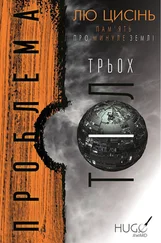
![Лю Цысинь - Эпоха сверхновой [litres]](/books/393110/lyu-cysin-epoha-sverhnovoj-litres-thumb.webp)
